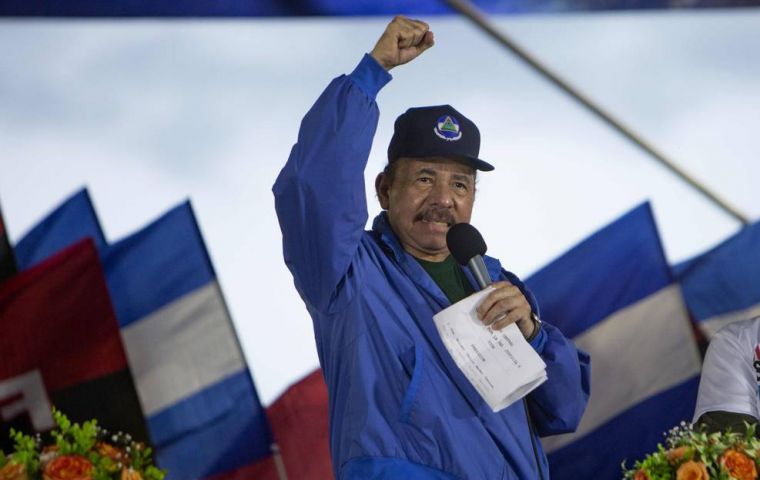MercoPress. South Atlantic News Agency
Arrests of Nicaraguan opposition leaders continue despite international condemnation
 Ortega has outdone Somoza, the dictator he overthrew in 1979, opposition leaders say.
Ortega has outdone Somoza, the dictator he overthrew in 1979, opposition leaders say. The Government of Nicaraguan President Daniel Ortega continued with its arresting spree against opposition leaders over the weekend despite international condemnation against that type of practices. The arrests bring to 12 the number of opponents detained since June 2.
Police on Sunday placed Suyen Barahona under custody, the leader of the left-wing opposition Unamos party, while three other party officials were arrested by police over the weekend.
Barahona is among nearly a dozen opposition leaders as well as presidential hopefuls who this month have been detained or disqualified from running in the presidential contest, which will be held in November. “It’s not just potential candidates anymore, it’s political leaders,” said former general and Sandinista dissident Hugo Torres. “This is not a transition to dictatorship, it is a dictatorship in every way,” he added
The crackdown began on June 2 when police raided the home of Cristiana Chamorro, journalist and would-be presidential candidate, on charges of money laundering shortly after she announced her intention to run in the elections.
Under legislation passed in December, Ortega’s government has the power to unilaterally declare citizens “terrorists” or coup-mongers, classify them as “traitors to the homeland” and ban them from running as candidates. The law the government claims to be enforcing punishes those “who lead or finance a coup … encourage foreign interference, ask for military intervention … propose or plan economic blockades, applaud and champion the imposition of sanctions against Nicaragua or its citizens.” Treason is punishable by prison terms of up to 15 years.
Although Ortega has not yet confirmed whether he will seek re-election for a fourth consecutive term, there is widespread consensus he is first removing all potential challenges.
On Sunday, Nicaraguan police said Barahona was arrested for seeking to undermine the country’s independence and sovereignty, as well as for “inciting foreign interference in internal affairs, requesting military interventions and organizing with foreign financing”. Unamos slammed the latest raids and arrests. “These actions against the Unamos leadership are part of the escalation of repression from the Ortega regime against the democratic opposition,” the party said in a statement.
In addition to Barahona, police also arrested prominent ex-Sandinista dissident Dora María Téllez, another opposition leader, and Ana Margarita Vijil. Téllez was a leading Sandinista militant who led an assault on the National Palace in 1978, taking hostage the congress of dictator Anastasio Somoza in exchange for the release of Sandinista prisoners.
Following Somoza's overthrow, Téllez served as health minister in the first Sandinista government which ruled from 1979 to 1990. Like many former guerrillas, she later split with Ortega.
On Saturday, police arrested Tamara Dávila, who was active in Unamos, which was formed by former Sandinistas angered by Ortega’s autocratic ways, nepotism and perpetual re-elections. Police also claimed Dávila violated the new law. She is also a key figure in the opposition Blue and White National Unity coalition, which was formed following Ortega's repression of mass protests in 2018.
Ortega has already arrested four potential opposition candidates who might have challenged his bid for a fourth consecutive term, and now many Nicaragua opposition leaders fear it is only a matter of time until the police come for them, too.
Nicaragua’s National Police arrested four opposition pre-candidates earlier this month. On June 8, they arrested pre-candidate Félix Maradiaga, a pre-candidate for the opposition coalition Blue and White National Unity, and Sebastián Chamorro, a former director of the opposition coalition Civic Alliance. The previous week authorities detained Cristiana Chamorro, a cousin of Juan Sebastián Chamorro, and Arturo Cruz Sequeira, a former ambassador to the United States.
Ortega initially led Nicaragua from 1979 to 1990 following the Sandinista revolution that ousted Somoza. He returned to the presidency in 2007 after three failed election attempts, and he won reelection in 2011. He then sidestepped term limits to get himself reelected in 2016 and packed courts and government agencies with allies. The Sandinista party controls the courts and the legislature and has stifled universities and the Roman Catholic church.
Torres said Ortega has now instituted a more suffocating dictatorship than Somoza, who faced opposition from within the church, intellectual circles and universities. “I think Ortega has outdone Somoza,” said Torres. “He has subordinated all the power to himself as Somoza never could. He has a bigger repressive apparatus than Somoza ever had.”
Julie Chung, the U.S. State Department’s acting assistant secretary for Western Hemisphere affairs, said via Twitter that Ortega's “campaign of terror continues with more arbitrary arrests this weekend. OAS members must send a clear signal this week: enough repression. The region cannot stand by and wait to see who is next.”




Top Comments
Disclaimer & comment rulesCommenting for this story is now closed.
If you have a Facebook account, become a fan and comment on our Facebook Page!